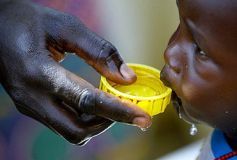Aid workers strive to protect children from Darfur war
May 19, 2006 (ABU SHUK, Darfur) — In one of Darfur’s largest camps, aid workers are trying to offer some semblance of normal life to thousands of children displaced and traumatised by the three-year-old conflict in the western Sudanese region.
 Two years ago, Suad Mohammed’s village in the Tawila area was looted and torched by the Janjaweed, the marauding pro-government militias who face accusations of genocide against ethnic minorities in Darfur.
Two years ago, Suad Mohammed’s village in the Tawila area was looted and torched by the Janjaweed, the marauding pro-government militias who face accusations of genocide against ethnic minorities in Darfur.
She fled with her four children and now runs a shelter for children in Abu Shuk, a large camp for internally displaced people near Al-Fasher, the capital of North Darfur.
Like the 50,000 people living in the camp, she relies on aid to survive and feed her family.
But her life took a turn for the better when she started working for Children of the World-Human Rights, a French NGO which has set up 15 centres hosting some 4,000 children aged between two and six in Abu Shuk.
For 100 dollars a month — a hefty sum in this part of the world — Suad now runs one of these centres, where children receive education and psychological assistance from trained personnel.
The Darfur conflict erupted in February 2003, when ethnic minority rebels complaining of marginalisation staged a rebellion which was brutally repressed by government troops and their proxies.
The combined effect of war and famine left some 300,000 people dead and displaced more than 2.4 million, in what the United Nations has described as the world worst humanitarian crisis.
When she speaks of her forced exile, Suad’s gaze freezes in painful remembrance.
“Armed men came to our village of Tawila. They burned our houses and chased us out,” she says, omitting to name her aggressors as if she still feared possible reprisals.
When asked if it was the Janjaweed who attacked her village, she gives a quick nod and explains how she fled with 10 family members and ended up in Abu Shuk with thousands of other survivors.
“In the camp, we’re safe,” she says, smiling at an excited gaggle of children playing on mats rolled out in the sand. Some of them sing to cheer their friends running a frantic potato sack race.
“Our team includes three expatriates. The others are all Abu Shuk residents, whom we trained,” says Delphine Magre, project manager for Children of the World-Human Rights.
The NGO, which relies on dozens of volunteers, coordinates its activities with Sudan’s education ministry and receives financial support from the UN’s children fund UNICEF and the European Commission.
According to UNICEF, continued insecurity in Darfur has meant that the aid net continues to miss more than one million children, half of whom are under the age of five.
“The idea here is broaden the horizon of these children,” Magre explains.
With a flurry of activities including drawing classes, music and games, the centres seek to provide the children with occupations that will help them recover from the trauma of war and famine.
The NGO’s modern teaching methods also reassure parents in a region where schoolteachers tended to favour the pedagogy of the metal ruler.
But the most important goal of the NGO is to ensure that the local community will eventually inherit such education principles from what is meant to be a temporary set-up catering to the needs of people displaced by war.
“In the long run, we hope to hand over these centres to the communities around here,” Magre explains.
Further into Abu Shuk, dozens of children take their afternoon nap protected by another centre’s thatched roofs and walls consisting of UN-stamped tarpaulin.
The camps are a little island of peace and a makeshift playground for some of Darfur’s children, many of whom were born in the very midst of one of the world’s most deadly ongoing conflicts.
The Sudanese government signed a partial peace agreement in May with the largest Darfur rebel faction after Washington upped the pressure for African Union-sponsored talks to yield a deal.
But two smaller factions have yet to endorse the accord, disarmament has yet to begin in earnest and observers have warned that few peace dividends would be felt if UN troops did not take over peacekeeping operations.
For the children of Abu Shuk, the prospect of a return to normal remains distant. “We’re going to be here for a while,” predicted a UNICEF worker.
(ST)
